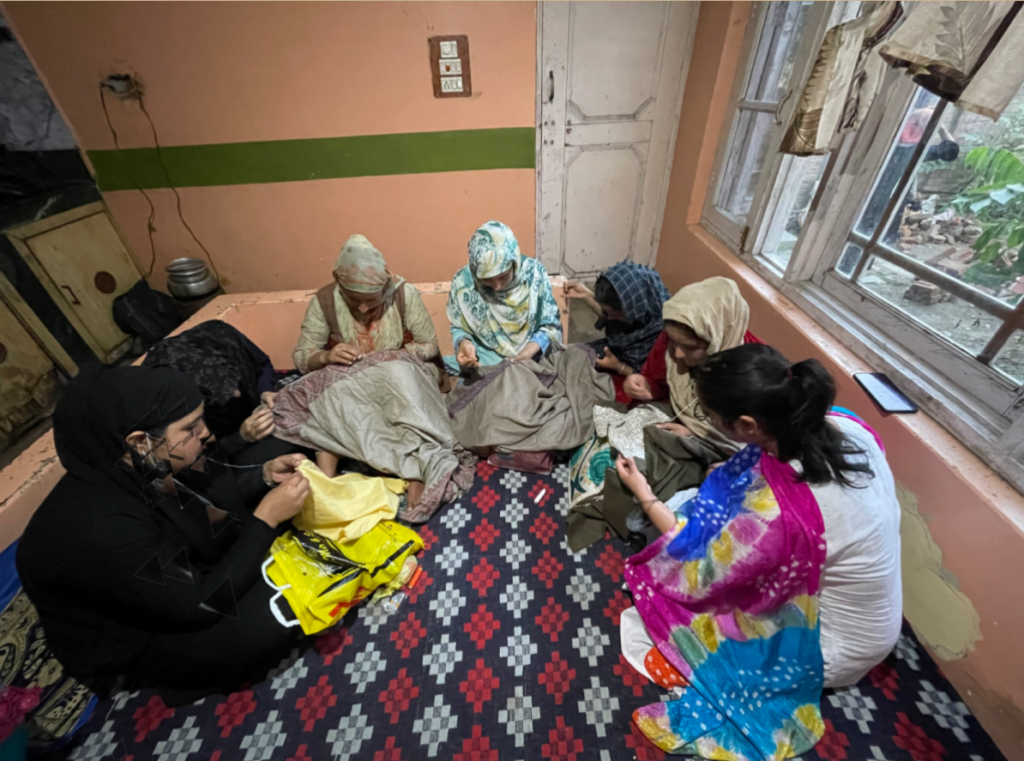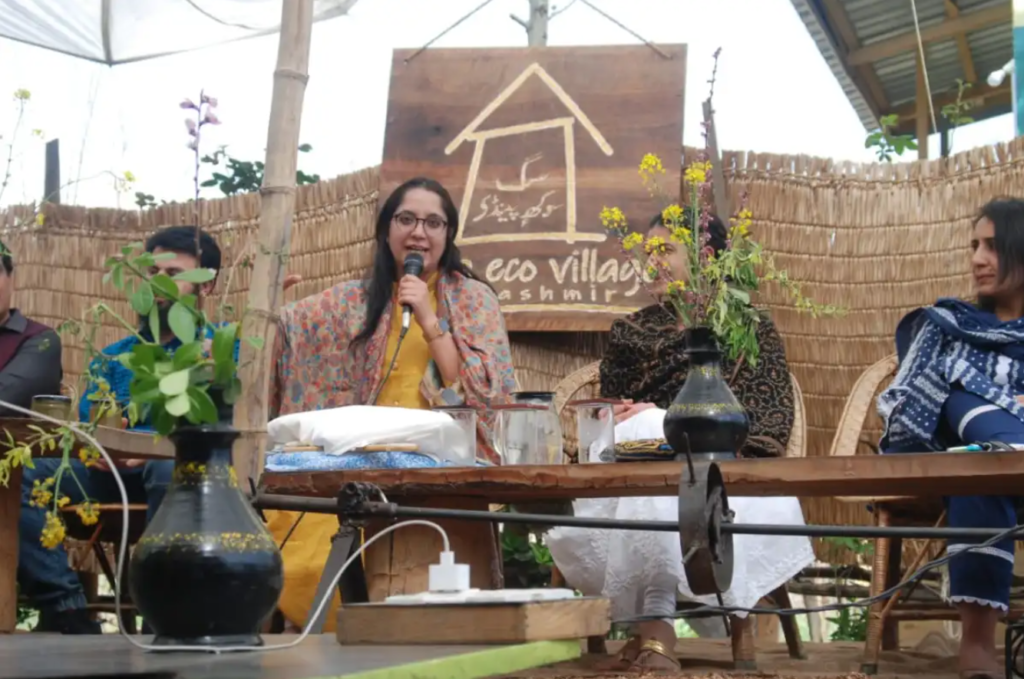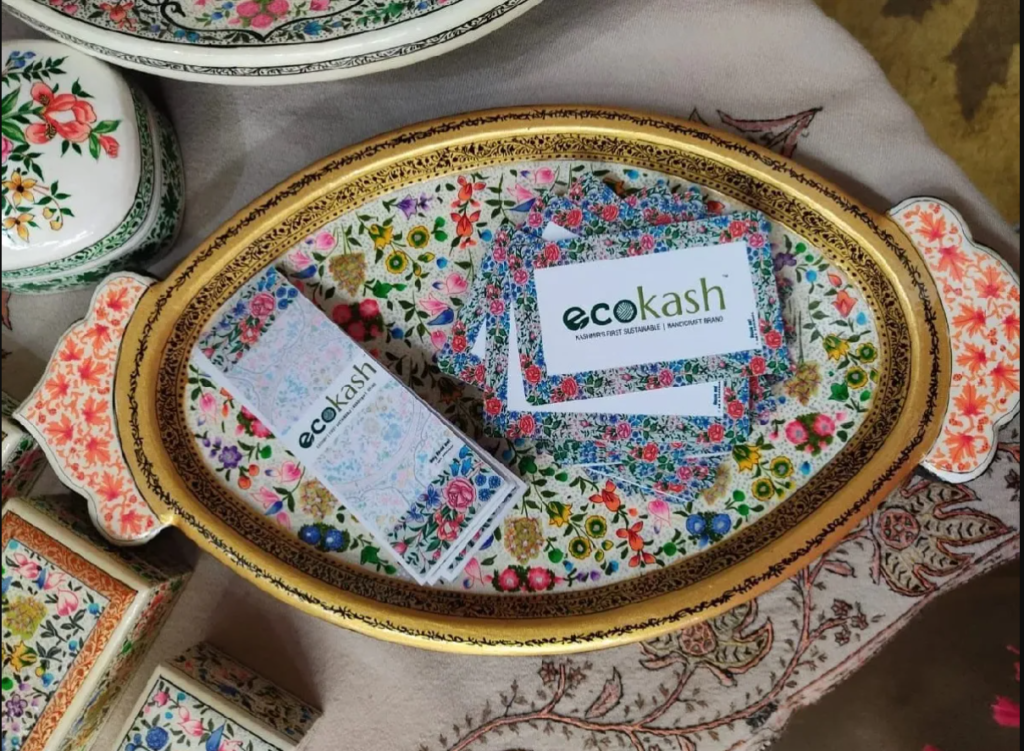“Kashmiri art is on the decline. It is vanishing at a very fast pace. We must do something for its revival.”
Insha Mir and Fouzia Bhat Kashmir met in 2020 during their fellowship with the Naropa Fellowship in Ladakh. The two young women quickly sparked on the idea of creating a startup that aims to preserve the authenticity of Kashmiri handicraft and clothing.
The young entrepreneurs have gone one step further: utilizing the talents of underprivileged women homeworkers in the region. They named their start-up EcoKash, an amalgamation of eco-friendliness and Kashmir.
Women entrepreneurs are rare in Kashmir. But the young women got a jump start with financial support from the young Indian billionaire entrepreneur Ritesh Agarwal, founder and CEO of OYO Rooms.
Ritesh Agarwal
“Truly delightful to witness fantastic entrepreneurial ideas in their early stages, doubly so when they serve their community as brilliantly as EcoKash does,” said Agarwal, who has supported four Naropa Fellowship startups. The fellowship aims to foster entrepreneurship in the Himalayan region.
In an interview with India Currents, Insha Mir talks about the challenges she and Bhat have faced, their vision for their company, and advice for women who hope to be entrepreneurs.
IC:Talk us through your brand, the story and inspiration behind it.
Insha: I always wanted to pursue fashion and do something for the revival of handicrafts in Kashmir. All the crafts found in this area were brought to Kashmir by a person honorifically known as Shah-e-Hamadan. He was a religious scholar who came from Iran. He brought with him a hundred skilled men. He not only wanted to propagate Islam in Kashmir but also enable people to earn their livelihood through the skills learned. Around 20 crafts ranging from embroidery to paper mache to carpet weaving were taught by these skilled men.
My grandfather left his government job and took to wood carving to earn his livelihood. Our relatives were also artisans. So I can say I belong to a family of artisans.
Hands Of Gold
The artisans are not paid fairly. Most of the men and women who are associated with the handicrafts have quit, and that includes my grandfather also. My grandfather’s hands were called the “the hands of gold” because he was good at designing. We still have some of his artefacts at home. But he did not pass it on either to his son or his daughter because artisans are not paid enough.
Our art is on the decline. It is diminishing at a very fast pace. It pains me. So, I really want to do something for its revival.

What did the Naropa Fellowship add to your entrepreneurial goals?
Insha: It was during the fellowship I was introduced to sustainability. I was also introduced to Ikigai during one of the classes of the fellowship. I found two pain points. One, how to contribute to the environment and lessen the burden humans are putting on it. Second, how to revive the handicraft. I also got to know there that I can club these two and that is when Ecokash was born.
In Kashmir, where chaos and uncertainties of various sorts always loom, tell us what was going on in your head when you started this venture.
Insha: I had my own fears whether Ecokash could run in the circumstances we often see in Kashmir. It was also very difficult to find investors because all of them said the same things: You belong to a conflict zone. You are a woman. How would you take on this journey? What if you get married and your husband doesn’t allow you to work? What if you get busy with your children? How can we trust you that you will survive in the market? But when you really want something, you don’t think about the hurdles or the journey, but the end destination where you want to reach. That keeps you going. I had this thing in my mind that I want to provide authentic and sustainable Kashmiri handicraft and give people an option to fast fashion.
Describe that feeling when Ritesh Agarwal announced his support for Ecokash.
Insha: I was numb and thought that I was dreaming. When I was in Ladakh during the fellowship, I got a chance to pitch my project to many investors. Everybody liked the idea but they had the same issues I mentioned earlier. I was discouraged and I cried a bit. However, one of the investors was a manager with OYO Rooms through whom our pitch went to the CEO of OYO Rooms. Within the next few months we got an equity free grant from the company and that was really big for Ecokash to take the first step.

Is Ecokash going to be Kashmir-centric or global?
Insha: We see a huge potential in the international market. But that does not mean we are negating the national and local market. We started with the idea that we will be reaching globally, to conscious buyers who know about sustainability.
What is your message to women who aspire to be entrepreneurs but can’t find a way?
Insha: First of all, ask yourself what you love to do and what keeps you going. I learnt this from a TED talk. Think of one thing in your life that – when you are doing it – you forget everything else, be it food or a boyfriend for that matter. And when you get that answer, go for it. Before thinking about the society, talk to your family. They may not allow, but you have to convince them. And doing that needs courage and a lot of inspiration.
What does being independent mean to you as a woman?
Insha: Independence is in my blood or in every woman for that matter. When you are independent, you become confident enough to pursue things and support other people. That is what independence teaches you.
If you are not happy yourself, you will never be able to make others happy either. The same thing applies here. You have to do it for yourself first and then do it for others. Nobody is going to do things for you. And the moment you realize you have become independent, it is unstoppable, a contagious feeling. When you interact with people, they feel it too.
Article Credits: India Currents

Pingback: These 2 Indian-origin entrepreneurs feature in Fortune’s 40 under 40 list - SLSV - A global media & CSR consultancy network
Pingback: Meet Zaiba Sarang, the entrepreneurial thinker behind iThink Logistics - SLSV - A global media & CSR consultancy network